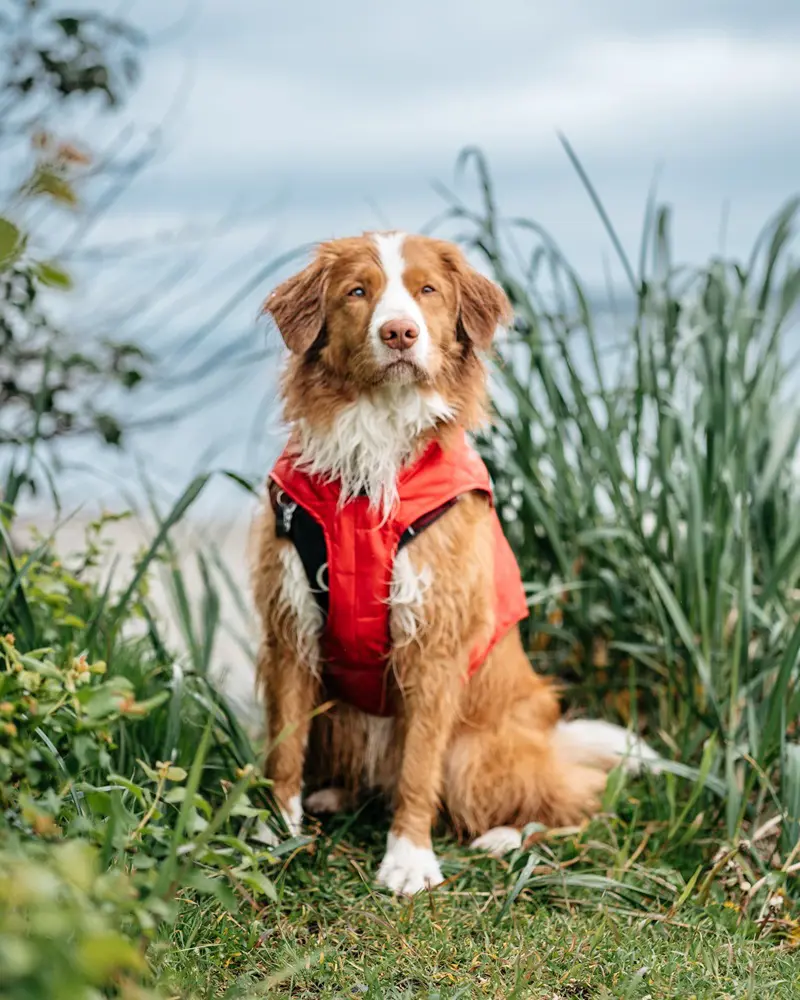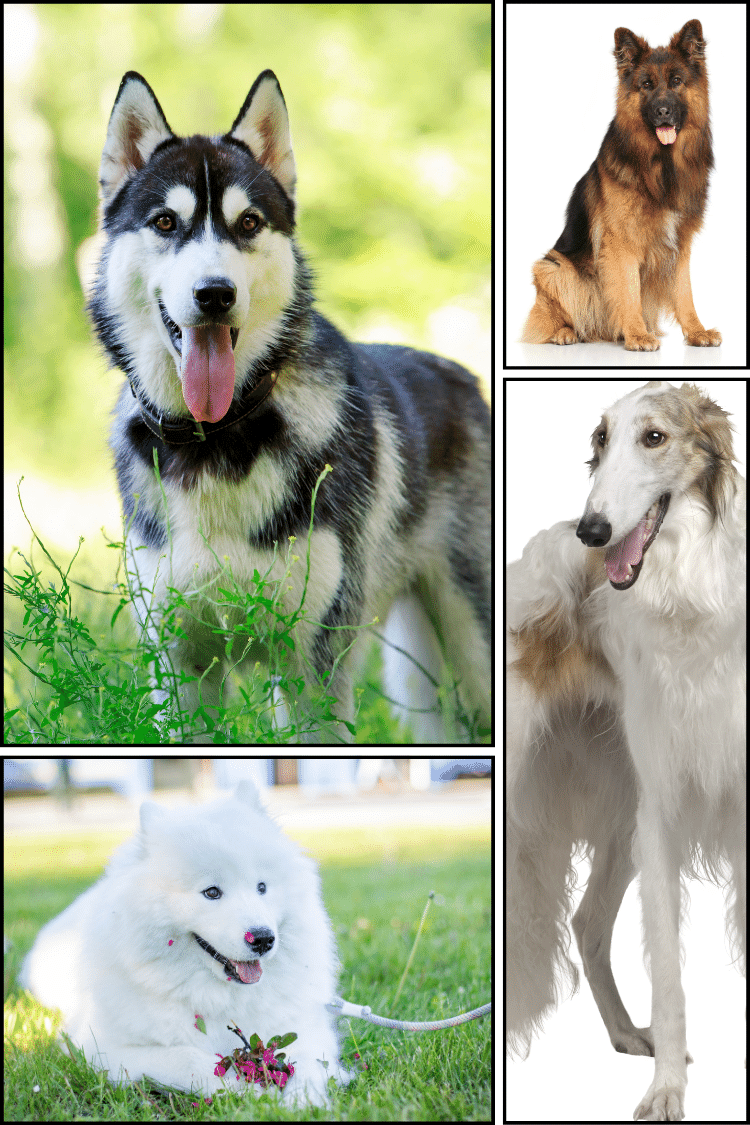Nova Scotia Duck Tolling Retriever Dog Breed Information

Nova Scotia Duck Tolling Retriever Dog is a member of the retriever family. Also known as Tollers, they were originally bred for hunting waterfowl (the name comes from the tolling technique used for hunting).
Intelligent and curious learners, Tollers excel in retrieving games from both water and land like other retriever breeds. In this article, we will provide you with detailed information about the Nova Scotia Duck Tolling Retriever Dog Breed.
Overview
Tollers are medium-sized dogs with a well-balanced and muscular build. Despite being one of the smaller retriever breeds in terms of population size, Tollers have gained popularity among dog enthusiasts for their unique abilities and charming personalities.
Let's have a look at some of their characteristics below:
- Height: 17 to 21 inches
- Weight: 35 to 50 pounds
- Size: Medium
- Lifespan: 12 to 14 years
- Standard Colors: Red and Red Gold
- Markings: White markings
- Personality/ Temperament: Friendly, Kind and Intelligent
- Kid Friendly: Yes
- Other Pets Friendly: Yes
History

The Nova Scotia Duck Tolling Retriever, also known as Toller, is a dog breed that was developed in the region around Yarmouth County, Nova Scotia. The breed's exact origin involves a blend of several retriever-type dogs including Chesapeake Bay Retriever, Cocker Spaniel, Irish Setter, and some local working dogs.
The breed was specifically bred for tolling. Tolling is a hunting technique where these retrievers swish their tail running along the shoreline. This attracts the curiosity of ducks that are out on the water in rafts or groups.
As the ducks come closer to investigate what's going on, retrievers shoot them and fetch them to the shore.
For their hunting abilities, Nova Scotia Duck Tolling Retrievers are classified as part of the Sporting Group. As of now, they have gained recognition as good companion dogs for their friendly demeanor, gentleness, and kind behavior.
Characteristics Ratings of Nova Scotia Duck Tolling Retriever Dog
Here, we have rated the characteristics of Nova Scotia Duck Tolling Retriever Dog out of 5:
| Characteristic | Rating |
| Intelligence | 5/5 |
| Alertness | 4.5/5 |
| Friendliness | 5/5 |
| Energy Level | 5/5 |
| Trainability | 5/5 |
| Playfulness | 5/5 |
Temperament And Intelligence

Nova Scotia Duck Tolling Retriever, although is a working dog, possesses a very sweet and friendly demeanor. The temperament of these breeds is briefly described below:
Friendly and Outgoing: Their friendly and outgoing nature is what makes them perfect pets. If they get to properly socialize from the beginning years, they will definitely be the center of attention in everyone's home. They are eager to learn their surroundings and can get comfortable in a new environment in a very little time.
Energetic: As they are working dogs, they are highly energetic. They require plenty of physical exercise daily and enjoy going for a walk or hike, playing, swimming and fetching.
Alert and Watchful: Tollers have a natural alertness and can make good watchdogs. They are very curious and attentive to the surroundings they are living in. If anything unusual happens, they quickly alert their owners.
Highly Intelligent: Tollers are intelligent dogs that are quick to learn. They can easily involve and grasp commands in the training session. Their highly intelligent nature makes them a perfect duck Toller. They can easily locate, lure and attack the ducks without missing the shot.
Problem-Solving Ability: They have a knack for problem-solving. This quality helps them to adapt to different situations. As they are hunting retrievers, Tollers have been trained to perform tasks which demands problem solving skills. Retrieving games from water or luring ducks closer to hunters are the best examples of their problem-solving skills.
Sensitivity: Tollers can respond to their owner's moods and commands. This makes them obedient. Upon getting consistent rewards, they will act sensitively on the training sessions as well.
Persistence: These dogs don't easily give up. They have a strong-willed determination that makes them continually go for what they want. This trait serves them well in both hunting scenarios and in challenging training exercises.
Strong Retrieving Instincts: Bred for retrieving ducks and other waterfowl, Tollers have a strong natural retrieving instinct. They are excellent swimmers and enjoy water activities.
Puppies of Nova Scotia Duck Tolling Retriever Dog

To obtain a healthy Nova Scotia Duck Tolling Retriever puppy, you can either purchase them from reputable breeders or adopt them. It's best to get these retriever puppies from responsible breeders.
American Kennel Club Marketplace (AKC) allows you to search for a reputable breeder. Make sure these breeders provide prioritized health testing and good care of the puppies.
If you want to adopt the Nova Scotia Duck Tolling Retriever from rescue organizations, find a reliable source for the purchase. These rescued ones end up there for a variety of reasons and may need proper health examinations. NSDTRC (USA) Rescue Program and Toller Rescue Inc. are the most trusted sources to help you find a rescued one.
Whatever option you choose to adopt an NSDTR pup, make sure to ask for their health history and temperament and once you bring them home, start early socialization and training.
Are Nova Scotia Duck Tolling Retrievers Family Dogs?
Nova Scotia Duck Tolling Retrievers can make wonderful family dogs, Medium in size, their structure is not intimidating. Rather they have a kind and gentle appearance, making them perfect for families with kids.
They have friendly and affectionate behavior and make close bonds with family members. They also form special bonds with kids and enjoy engaging and playing with them.
The family owners must not forget that Tollers are highly energetic. They may best fit for active families. They benefit from a home with enough space to move around freely.
As they are perfect swimmers, households may consider providing them access to swimming. This will provide them with the best exercise possible and allow them to burn off excess energy.
Can Nova Scotia Duck Tolling Retrievers Coexist With Other Pets?
Tollers can generally coexist well with other pets, including dogs and cats. It's necessary to be aware of the fact that as they belong to the retrieving breeds, Tollers have a moderate to high prey drive.
So, you may find them chasing smaller animals such as cats or small pets. This can be prevented by socializing them early on.
Tollers often enjoy the company of other dogs and can form strong bonds with them. They can be found constantly being involved in playing activities with dogs of their similar size and over time can become very good friends.
As Tollers have a friendly and generally sociable temperament, this facilitates their relationships with other pets.
Caring and Grooming
Here are some tips for caring and grooming Nova Scotia Duck Tolling Retriever Dogs:
Grooming
Nova Scotia Duck Tolling Retriever Dogs are low-maintenance. With minimal caring and grooming, they can be kept healthy and happy. Here are some important considerations:
Coat Maintenance: Tollers have a water-resistant double coat; a dense undercoat and a longer, straight outer coat. The coat must be brushed regularly, 2 to 3 times a week is a must.
This prevents the entangling and removes loose hair. Areas behind the ears, underarms, and hindquarters are much more prone to matting, so these areas require proper attention. Also, trim any excess hair between paw pads to prevent matting and debris buildup.
Bathing: Tollers don't usually get dirty. You can bathe your Toller typically every 4-6 weeks or when they get dirty. Consider using a mild dog shampoo to avoid any kind of skin irritation.
Other Grooming Needs: Except for their coat, the nails of the Nova Scotia Duck Tolling Retriever Dogs should also be maintained. Trim their nails at a comfortable length so they don't get problematic.
Always check their ears and eyes for any sign of infection. Clean their ears gently with a dog ear cleaner or a damp cloth once in a while. Also, brush their teeth regularly to prevent plaque buildup.

Exercise
Tollers are active dogs. They need at least 1-2 hours of exercise every day to stay happy and healthy. As they are natural retrievers, activities that involve retrieving like balls, frisbees, and toys can be best for them.
Also include walking, jogging, hiking, playing fetch, and swimming in their exercise routine. Don't perfect they are perfect swimmers, and allowing them to swim regularly will help prevent fat build-up in the body.
Training
Tollers are highly intelligent dogs. They respond accurately to the training sessions, that is what makes them perfect duck tollers! Always treat them with rewards like treats, praise, and play as encouragement. Tollers respond well to rewards and enjoy pleasing their owners.
As Tollers can be independent-minded, patience and persistence are key. Keep training sessions short and fun to maintain their interest. For the best results, try to be consistent with the commands and expectations to help them understand what is expected of them.
Dietary Requirements
Premium-quality dog food specifically formulated for active breeds is necessary to feed Nova Scotia Duck Tolling Retrievers. A label that indicates the food meets AAFCO (Association of American Feed Control Officials) nutrient profiles must be present in the packaging.
Make sure that the food provides a balanced combination of protein, fats, carbohydrates, vitamins, and minerals suitable for your Toller's age, size, and activity level. Any dog foods that contain excessive fillers, artificial additives, or by-products should be avoided.
A consistent feeding schedule should be maintained, consider feeding Tollers twice a day. Also, follow the guidelines provided on the dog food packaging, adjusting as needed based on their activity level and metabolism.
Things To Consider
- Certain foods can be toxic to dogs. Avoid feeding xylitol and any kind of chocolates to Toller.
- Avoid feeding cooked bones or small, brittle bones. This can cause choking, digestive tract injuries, or obstructions.
- While fat is an essential part of a dog's diet, excessive amounts may lead to disorders related to the digestive system of the dog.
- Raw meat and fish can contain harmful bacteria and parasites. So, only serve cooked meat and fish to Tollers.
Potential Health Issues

Tollers are generally healthy dogs. However, like all breeds, they are susceptible to certain health conditions. Here are some of the potential health issues of Tollers:
Eye Problems: Like any other dog breed, Tollers are susceptible to eye infections. Collie Eye Anomaly (CEA) is commonly found to be present in Tollers, which is an inherited eye disorder that affects the development of the retina.
It can lead to problems in vision. Progressive Retinal Atrophy (PRA) is another defect that leads to vision impairment. PRA is a group of genetic diseases that cause the gradual degeneration of the retina.
Hip and Elbow Dysplasia: Hip dysplasia is a genetic condition where the hip joint does not develop properly. This leads to deterioration over time causing discomfort, pain, and lameness. Elbow dysplasia is also seen in some cases where the elbow joints are not developed well, making movements harder.
Autoimmune Disorders: Unfortunately, autoimmune disorders are the most common diseases affecting Tollers. These conditions occur when the body's immune system attacks healthy tissues.
Some common autoimmune diseases in Tollers include autoimmune thyroiditis and sebaceous adenitis. Autoimmune thyroiditis affects the development of the thyroid gland whereas sebaceous adenitis causes skin to become dry, flaky, and itchy.
To prevent and control these conditions, a regular veterinary checkup is a must. With proper care and veterinary attention, most Tollers can live long and healthy lives.
Male Vs Female
Male Tollers are slightly larger and more muscular than females. This size difference however may not be significant. Male Tollers are also more assertive and confident, particularly around other male dogs.
They may exhibit more dominant behavior, which can be managed through training and socialization. Some owners find male dogs to be more independent and less clingy compared to females.
Males also have slightly higher energy levels and are more playful. This can be fun to watch but it is important to know that such dogs need more exercise to spend their energy. Females are more known to be affectionate and loving.
They may exhibit maternal instincts even if they haven't had puppies. As females give birth to pups, they show more affection and protectiveness.
Facts About Nova Scotia Duck Tolling Retriever Dog
- Nova Scotia duck tolling retriever dog was originally bred to hunt ducks. They are known for their unique ability to toll ducks within gunshot range. They hunt ducks by playing and splashing in the water.
- They are the smallest of the retriever breeds.
- They have an eye-catching appearance. They come in a wide range of colors and have white markings, typically on their chest, legs, and tail.
Top Lists







